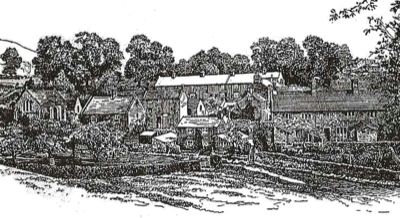From the rag house, through trap doors, the rag descended from Lydia and her fellow workers to a huge object like a mowing machine. The rags came to this monster and passed through its whirling knives. Then, having been clipped pretty small, they were carried on an endless ribbon up again to the magnet. Two great magnetized rollers revolved, and, in a dingy niagara, every fraction of the old rag tumbled over them, to run an electric gauntlet and receive a challenge. The bossy rollers were even quicker than the women's fingers, and a fraction of metal, however small, responded to their attraction instantly. There was a click and instead of falling with its neighbours, the offending rag found itself arrested and pilloried on a boss. It clung to the roller, and, as the cylinder turned, became de-magnetized again and fell in a place apart. The danger to future processes was thus lessened materially and but little foreign matter in shape of metal escaped to be a nuisance later on.
Reference: The Story of Handmade Paper (1924)

Wookey Hole Village, Somerset
To the duster then came the harassed rag and in open wire barrels amid revolving wooden prongs it was whirled round and round and further cleansed.
Then to Henry Barefoot it went, and Henry always declared that in his hands the material received first serious treatment.
"The rag don't know it's born till it gets to the boilerman," he was wont to say.
The boiler-house lay under an arched roof of corrugated iron. It was a damp place, full of hot air and the heavy scent of washing. The steam thinned and feathered away through holes in the roof. In the floor were deep square hollows and here the boilers revolved, with a solemnity proper to their size.
They were huge metal receptacles capable of holding a ton each; and when the rag was packed, with water and alkalies to cleanse it, the loaded giant turned ponderously over and over, churning the mass for three or four hours. Then the seething clouts were dragged forth, their pollutions drained away and further stages of lustration entered upon.
Thus far the rag had come under rough control and reign of law. By air and water and chastening of many blows it was reduced to a limp and sodden condition, amenable to discipline, more or less prepared for the tremendous processes between its final disintegration as rag and its apotheosis as paper.
A paper man will tell you he turns "old shirts into new sheets" : and that indeed is what he does; but a long and toilsome journey lies between the old shirt and its apotheosis.
Henry Barefoot was a placid man, as long as the rag came to him exactly when he wanted it. Under ordinary circumstances he accomplished his part in the great machine as obscurely as any invisible wheel, or steam pipe. But if the women delayed, or he was "hung up," as he put it, then his chivalry broke down and he swore long and loud at those who interfered with his activities. At such times he became tragic and exceedingly profane. He expanded and broke into uncouth gestures and simian scowls. He appealed to Heaven in these great moments and asked of the sky why women had been created. Sometimes his sister, Alice, was sent for from the thresher to pacify him, and when she failed, Lydia Trivett, at the sound of Henry's roaring in the boiler-house, would slip from her lattice and strive to calm his fury.